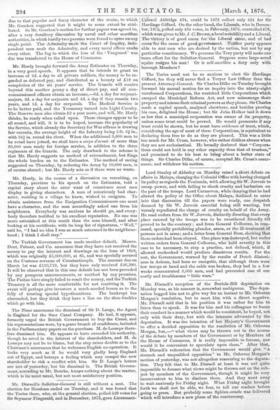Mr. Disraeli's reception of the Burials-Bill deputation on Monday was,
as his manner is, somewhat ambiguous. The depu- tation begged him not to give way for an instant to Mr. Osborne Morgan's resolution, but to meet him with a direct negative. Mr. Disraeli said that in his position it was rather for him to listen than to speak. It was for him and his colleagues to frame their conduct in a manner which would be consistent, he hoped, not only with their duty, but with .the interests advocated by the deputation. It was tire intention of her Majesty's Government to offer a decided opposition to the resolution of Mr. Osborne Morgan, but,—" what views may be thrown out in the course of the debate by members of the Government or by Members of the House of Commons, it is really impossible to foresee, nor would it be convenient to speculate' upon them." After that, Mr. Disraeli's reiteration that the Government would give. "a staunch and unqualified opposition" to Mr. Osborne Morgan's motion of yesterday, was not altogether reassuring to the deputa- tion. They felt that to Mr. Disraeli at least it was not quite impossible to foresee what views might be thrown out on the sub- ject by members of the Government, though it might be very inconvenient to him to disclose them. And they went away to wait anxiously for Friday night. What Friday night brought forth we shall not be able, we fear, to tell our readers before going to press. But probably some Sphinx-oracle was delivered which will introduce a new phase of the controversy.


































 Previous page
Previous page